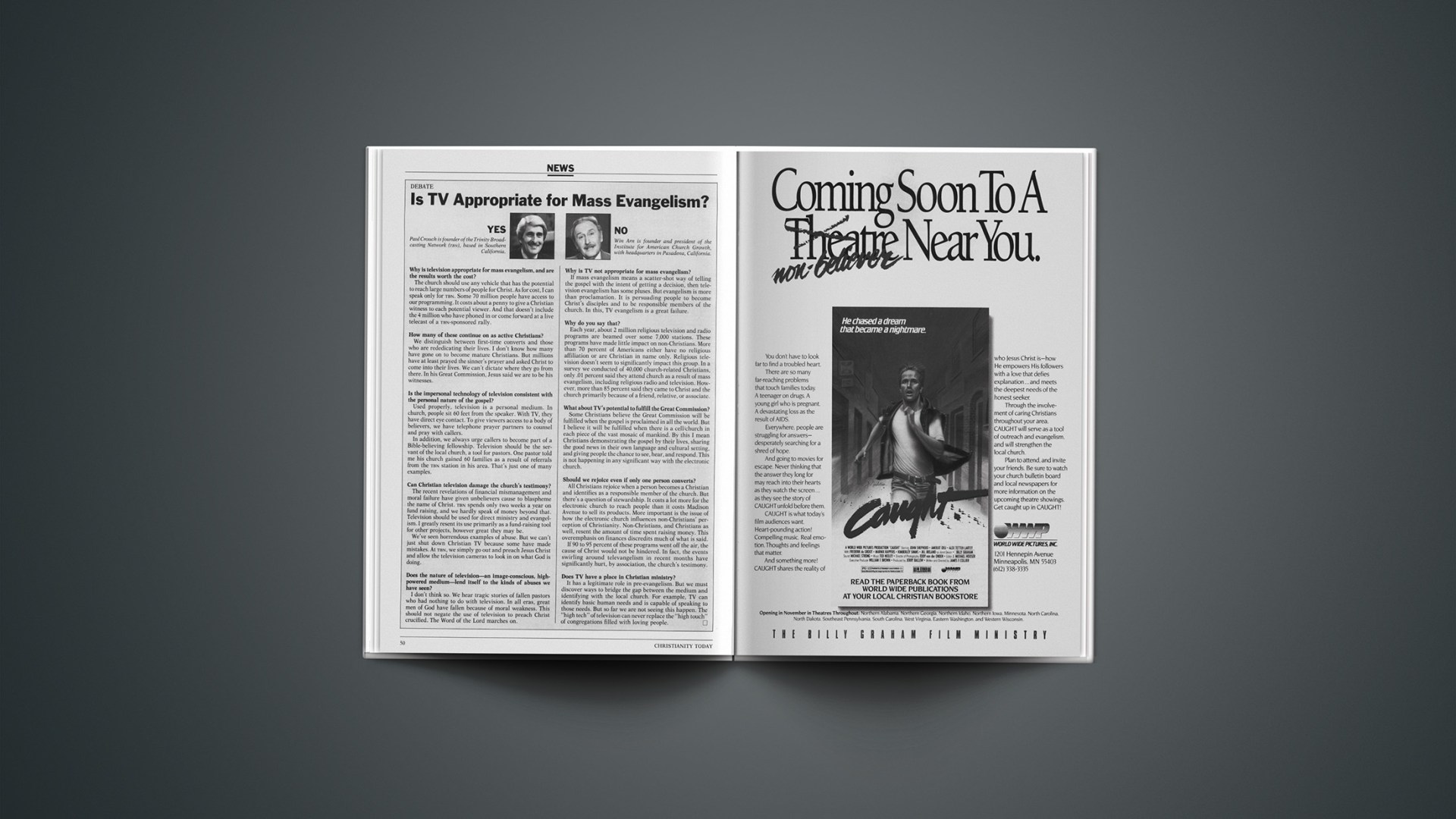YES
Paul Crouch is founder of the Trinity Broadcasting Network (TBN), based in Southern California.
Why is television appropriate for mass evangelism, and are the results worth the cost?
The church should use any vehicle that has the potential to reach large numbers of people for Christ. As for cost, I can speak only for TBN. Some 70 million people have access to our programming. It costs about a penny to give a Christian witness to each potential viewer. And that doesn’t include the 4 million who have phoned in or come forward at a live telecast of a TBN-sponsored rally.
How many of these continue on as active Christians?
We distinguish between first-time converts and those who are rededicating their lives. I don’t know how many have gone on to become mature Christians. But millions have at least prayed the sinner’s prayer and asked Christ to come into their lives. We can’t dictate where they go from there. In his Great Commission, Jesus said we are to be his witnesses.
Is the impersonal technology of television consistent with the personal nature of the gospel?
Used properly, television is a personal medium. In church, people sit 60 feet from the speaker. With TV, they have direct eye contact. To give viewers access to a body of believers, we have telephone prayer partners to counsel and pray with callers.
In addition, we always urge callers to become part of a Bible-believing fellowship. Television should be the servant of the local church, a tool for pastors. One pastor told me his church gained 60 families as a result of referrals from the TBN station in his area. That’s just one of many examples.
Can Christian television damage the church’s testimony?
The recent revelations of financial mismanagement and moral failure have given unbelievers cause to blaspheme the name of Christ. TBN spends only two weeks a year on fund raising, and we hardly speak of money beyond that. Television should be used for direct ministry and evangelism. I greatly resent its use primarily as a fund-raising tool for other projects, however great they may be.
We’ve seen horrendous examples of abuse. But we can’t just shut down Christian TV because some have made mistakes. At TBN, we simply go out and preach Jesus Christ and allow the television cameras to look in on what God is doing.
Does the nature of television—an image-conscious, high-powered medium—lend itself to the kinds of abuses we have seen?
I don’t think so. We hear tragic stories of fallen pastors who had nothing to do with television. In all eras, great men of God have fallen because of moral weakness. This should not negate the use of television to preach Christ crucified. The Word of the Lord marches on.
NO
Win AM is founder and president of the Institute for American Church Growth, with headquarters in Pasadena, California.
Why is TV not appropriate for mass evangelism?
If mass evangelism means a scatter-shot way of telling the gospel with the intent of getting a decision, then television evangelism has some pluses. But evangelism is more than proclamation. It is persuading people to become Christ’s disciples and to be responsible members of the church. In this, TV evangelism is a great failure.
Why do you say that?
Each year, about 2 million religious television and radio programs are beamed over some 7,000 stations. These programs have made little impact on non-Christians. More than 70 percent of Americans either have no religious affiliation or are Christian in name only. Religious television doesn’t seem to significantly impact this group. In a survey we conducted of 40,000 church-related Christians, only 01 percent said they attend church as a result of mass evangelism, including religious radio and television. However, more than 85 percent said they came to Christ and the church primarily because of a friend, relative, or associate.
What about TV’s potential to fulfill the Great Commission?
Some Christians believe the Great Commission will be fulfilled when the gospel is proclaimed in all the world. But I believe it will be fulfilled when there is a cell/church in each piece of the vast mosaic of mankind. By this I mean Christians demonstrating the gospel by their lives, sharing the good news in their own language and cultural setting, and giving people the chance to see, hear, and respond. This is not happening in any significant way with the electronic church.
Should we rejoice even if only one person converts?
All Christians rejoice when a person becomes a Christian and identifies as a responsible member of the church. But there’s a question of stewardship. It costs a lot more for the electronic church to reach people than it costs Madison Avenue to sell its products. More important is the issue of how the electronic church influences non-Christians’ perception of Christianity. Non-Christians, and Christians as well, resent the amount of time spent raising money. This overemphasis on finances discredits much of what is said.
If 90 to 95 percent of these programs went off the air, the cause of Christ would not be hindered. In fact, the events swirling around televangelism in recent months have significantly hurt, by association, the church’s testimony.
Does TV have a place in Christian ministry?
It has a legitimate role in pre-evangelism. But we must discover ways to bridge the gap between the medium and identifying with the local church. For example, TV can identify basic human needs and is capable of speaking to those needs. But so far we are not seeing this happen. The “high tech” of television can never replace the “high touch” of congregations filled with loving people.










